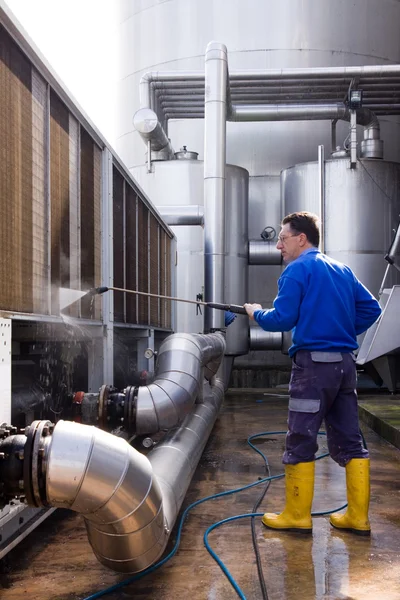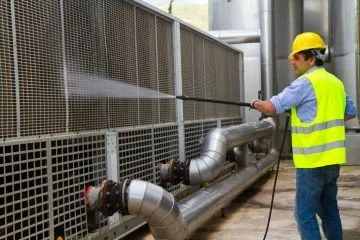
Maintaining clean, efficient air conditioning (AC) units is essential for commercial spaces, where high-functioning HVAC systems ensure comfortable environments and reliable temperature control. Pressure washing has become a popular method for achieving a deep clean of AC units, specifically targeting dirt, dust, and debris that can obstruct airflow and affect cooling efficiency. While pressure washing requires adherence to specific techniques and precautions to prevent damage, the advantages it provides make it an essential aspect of commercial HVAC maintenance. This article covers the significant benefits of pressure washing for commercial AC units, best practices recommended by manufacturers, and the importance of professional services for maintaining large-scale systems.
The Importance of Regular Maintenance and Cleaning for Commercial AC Units
In commercial settings, air conditioning systems often run for extended periods, frequently operating in dusty or debris-prone environments. This exposure can result in a buildup of particulates that impact air quality and clog key components, such as the condenser coils and fins. This can cause the system to work much harder to maintain adequate airflow, ultimately leading to higher energy bills, increased wear on equipment, and a shortened system lifespan. For instance, research from the U.S. Department of Energy indicates that obstructed airflow in commercial units can lead to a 15% increase in energy consumption, as systems are forced to compensate for the reduced efficiency
Air Conditioning Questions & Answers
Routine pressure washing offers a highly effective cleaning solution that addresses these challenges, restoring unobstructed airflow and facilitating effective cooling and heat exchange. In turn, regular cleaning helps commercial facilities control operating costs, improve equipment longevity, and maintain consistent indoor temperatures that promote comfort and productivity.
Advantages of Pressure Washing for Commercial Air Conditioning Systems
- Deep Cleaning and Debris Removal
One of the primary advantages of pressure washing commercial AC units is its ability to reach and remove dust, dirt, and debris that are difficult to eliminate through manual cleaning methods. Using a low-pressure setting and wide-angle nozzle, pressure washing can access and clear out debris from coils and fins, which are essential for proper airflow. This comprehensive cleaning goes beyond surface-level debris, removing even embedded contaminants that may inhibit the AC unit’s functionalitySmart AC FixHomeContractors.com. - Improved Energy Efficiency
Clean AC units are significantly more energy-efficient, particularly in commercial settings where systems are relied upon heavily throughout the day. By eliminating blockages and allowing airflow to move freely, pressure-washed units consume less energy to cool large spaces. This translates directly into utility savings, which can be substantial over time for commercial facilities with multiple or high-capacity HVAC units. Studies show that routine pressure washing can improve a unit’s energy efficiency by approximately 10-15%, yielding substantial savings and a reduced carbon footprintAir Conditioning Questions & AnswersSmart AC Solutions. - Extended Equipment Lifespan
Dirt and debris accumulation puts considerable strain on commercial AC units, especially components like the compressor and motor. When the system is forced to work harder to perform basic cooling functions, it accelerates wear on these vital parts. Regular pressure washing, however, alleviates this strain by maintaining clean coils and fins, helping the system to operate efficiently with less effort. By reducing the system’s workload, facilities can expect an extended operational lifespan from their units, ultimately resulting in fewer replacements or expensive repairsSmart AC FixHomeContractors.com. - Enhanced Indoor Air Quality
Clean coils and filters are less likely to circulate dust, mold spores, and other allergens throughout a facility. In commercial environments, maintaining a clean AC unit is key to sustaining good air quality, which is critical for the health and comfort of employees, clients, and customers. This benefit is particularly important for commercial settings like hospitals, schools, and office buildings where a large number of people are exposed to the indoor air supply. Pressure washing plays a vital role in preventing allergens and airborne pollutants from entering the air and creating a healthier environmentHomeContractors.comSmart AC Fix.

Manufacturer Recommendations for Pressure Washing Commercial AC Units
Due to the complexity of commercial air conditioning systems, manufacturers emphasize a careful approach when it comes to pressure washing. They provide detailed guidelines to ensure that cleaning is both effective and safe, preventing inadvertent damage to the unit. Below are some standard practices recommended by HVAC experts and manufacturers:
- Use Low Pressure and Wide-Angle Nozzles
Commercial units are particularly vulnerable to damage from high-pressure settings, which can cause aluminum fins to bend or dislodge. For this reason, manufacturers recommend using low-pressure settings with wide-angle nozzles, which allow for sufficient cleaning power without compromising the structural integrity of the unit. - Maintain a Safe Distance
Keeping a safe distance—generally about three feet—between the unit and the pressure washer prevents any inadvertent forceful impact that could damage coils and fins. By maintaining this safe distance, technicians can minimize potential damage while ensuring a comprehensive cleaning that reaches all necessary areas of the unitSmart AC Solutions. - Turn Off Power
Given the risks associated with water and electricity, it’s critical to turn off the power to the unit before starting any cleaning procedures. This prevents potential electrical hazards that can occur when water accidentally contacts sensitive electrical components. - Consult Manufacturer Guidelines or Use Professional Services
Manufacturers typically provide guidelines specific to each model, detailing best practices for safe maintenance. For complex or delicate commercial units, they may also advise relying on trained HVAC professionals who can safely and effectively perform the pressure washing, as these experts have the knowledge and tools to handle sensitive commercial equipment without causing unintended damageSmart AC Fix.
Risks of Improper Pressure Washing and the Value of Professional Services
While pressure washing offers clear benefits, there are risks associated with improper use that can lead to costly repairs or unit damage. High-pressure washing can bend delicate fins, crack coils, or allow water to infiltrate critical electrical components, causing electrical faults and even refrigerant leaks. For this reason, certified HVAC professionals are often recommended for commercial units. Trained technicians understand proper washing angles, distances, and pressure settings needed to avoid damage, and they can also inspect the unit for potential issues, such as corrosion or leaks, during the cleaning process. Professional maintenance ensures that each unit is cleaned safely, effectively, and in a way that enhances long-term reliability
Conclusion: Clean Commercial AC Units for Optimal Performance and Efficiency
Pressure washing offers commercial air conditioning systems an opportunity to operate at peak performance, achieving optimal energy efficiency, improved air quality, and a longer lifespan. By keeping these systems clean, commercial facilities benefit from lower operational costs, enhanced indoor comfort, and reduced environmental impact. Routine maintenance, especially with pressure washing, represents an investment in sustainable HVAC operation, protecting equipment and ensuring reliable performance.
For large-scale or complex commercial AC units, following manufacturer guidelines and using certified professionals for pressure washing is often the safest choice. This attention to detail helps businesses save on long-term energy costs, reduce the frequency of repairs, and maintain a consistent, comfortable indoor environment for employees, clients, and visitors.
